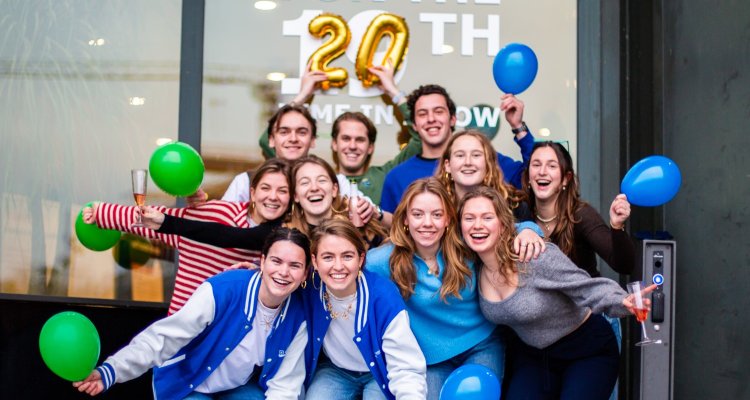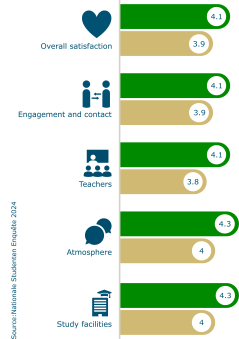
News
The best university in the Netherlands for the 20th time in a row – What is the magic of WUR?
Wageningen University & Research (WUR) has been elected the best Dutch university again by students. This is the twentieth consecutive year in which WUR is awarded this title. Why is that? According to students and staff, education in the world of Wageningen is flexible, personal, and practice-oriented.
The Keuzegids Universiteiten has once again named WUR the best university in the Netherlands. No fewer than 15 of Wageningen's 20 bachelor's programmes were awarded the ‘Top Programme’ label. Three programmes were even rated with 5 stars, the maximum number.

The Keuzegids ranking is based mostly on the Nationale Studenten Enquête (National Student Survey, NSE), but study success rates and employment market data are also included. The results of the National Student Survey 2024 leave no room for doubt: WUR scores above the national average on all twelve criteria. Other rankings also praise Wageningen’s education, particularly in the domains of nutrition, agriculture and environmental sciences. What causes WUR’s perpetually high ranking?
Close to students
Students often choose Wageningen for a specific study programme that is offered by only a few other universities, such as Biotechnology, Plant Sciences or Marine Sciences. Maartje Lamers enrolled in the Nutrition and Health bachelor’s programme, which she is enjoying: ‘Our programme offers a lot of options and flexibility. I have personal contact with the teachers, who generally respond to emails within a day. And my study advisor recently sent me an email saying that she hadn’t seen me for a while and inviting me to drop in.’
WUR is internationally oriented. In 2023, 11% of all bachelor students and just under half of all master students were internationals. ‘It is a world-class university’, says Margaréta Banas from Slovakia. Banas began her master’s in Resilient Farming and Food Systems in 2023. ‘The teachers are experts within their fields and they are kind and eager to help. The atmosphere on the campus is pleasant and I also enjoy the modern facilities, like the comfortable self-study spots.’ In contrast to most Dutch people, she even enjoys the mild weather.

The courses are practice-oriented. Being able to apply your newly acquired knowledge is very cool.
George Mikhailovski, from Belarus, is impressed with his Biobased Sciences programme: ‘The courses are very practical. One of my courses in biobased economy comprised four weeks of lectures and four weeks of project work, for which we were required to emulate a start-up on products made from hemp plants. How do the plants grow, what is the environmental impact, how do we make a business case, what about the logistics? Being able to apply your newly acquired knowledge is very cool.’
Small in scale, great in possibilities
There are a few words that keep popping up when Wageningen students talk about their study programmes: personal, human dimension, small scale. Most programmes are characterised by a relatively small number of students and a high number of contact hours. Teachers are approachable and spare no effort to help, says study advisor Suzanna Overtoom: ‘I frequently receive messages from teachers requesting me to reach out to a student they haven’t seen or heard from in a while. That is real care and personal involvement.’
Arie Nieuwenhuizen, who teaches human physiology at WUR, tries to always be open and accessible. ‘During practicals I walk the room and talk to students. And if I can help, I will always do my best to do so. Last year, for example, a student needed to resit an exam but was abroad for an internship during the time of the resit. The exam committee arranged for him to resit the exam during the summer, and I contributed to making that happen.’

Our student population is what makes us truly special. They are motivated and eager to learn.
Dedicated study advisors for each programme are closely concerned with student welfare. Moreover, there are student psychologists, deans, peer coaches, courses, workshops and more. Help and training are available for students with ADHD, and those who have lost loved ones have access to grief counselling.
At the same time, there is help for those who are reluctant to ask for support, says study advisor Gineke Boven. ‘I spend a lot of my time on students in the “lead group”. We discuss what steps we can take to make things more challenging. WUR offers many possibilities. Students of Business and Consumer Sciences, for example, conduct consumer studies for businesses, which truly benefit from these studies. And many of our students spend some time abroad, although it is not mandatory.’
Wageningen World
Wageningen education’s strength lies not only in its programmes and staff. ‘Our student population is what makes us truly special. They are motivated and eager to learn,’ says teacher Birgit Boogaard. Many of them have consciously decided to follow a programme in WUR’s key domain: life sciences. ‘My students want to address climate change and contribute to other critical challenges we face. That is something we see more often in this generation, and Wageningen attracts these students. As a university, that is certainly something to be grateful for.’

Come to Wageningen for your studies, stay for the vibe.
Together, the students and employees form a cosy, green community, the Wageningen world. ‘Wageningen is relatively small, so you run into each other often. On a terrace, at the supermarket, at the gym. That creates a sense of community,’ says Ingrid Hijman, head of the Student Service Centre. Moreover, most students are members of a study or student association, which play a critical social role. ‘Come to Wageningen for your studies, stay for the vibe’, says bachelor student Maartje Lamers.
‘Wageningen is a small, peaceful city with lots of activities. You will always find a community that shares your interest’, says master student George Mikhailovski. Moreover, Kamernet data shows that living in Wageningen is accessible. The average rent of 359 euros a month is well below that of other Dutch university cities. Additionally, the waiting time for a room is considerably shorter than elsewhere in the Netherlands. WUR aims to have all students who start their studies in the summer housed no later than 1 May.
Go the extra mile
WUR keeps striving to improve its education. Student Margaréta Banas is a member of the programme committee, which monitors the quality of her master’s programme. The committees consist of an equal number of students and teachers. ‘Our voice really counts. If we have a proposal on what could be improved, it is dealt with immediately’, she says. Teacher Arie Nieuwenhuizen often requests feedback from his students. ‘I recently designed a new teaching method and was eager to learn how the students felt about it. So, I invited six volunteers to have a coffee and discuss what they liked and disliked and what suggestions they might have. That provided some useful tips.’
Clearly, Wageningen’s high ranking is no coincidence. WUR employees go the extra mile, according to Ingrid Hijman. ‘This extra effort is sometimes taken for granted within the organisation, but it shouldn’t be. Teachers deserve more support; their workload is increasing.’ ‘We must keep critically reviewing our education’, says Birgit Boogaard, even now that WUR has been elected best university for the twentieth consecutive time. ‘We cannot rest on our laurels.’